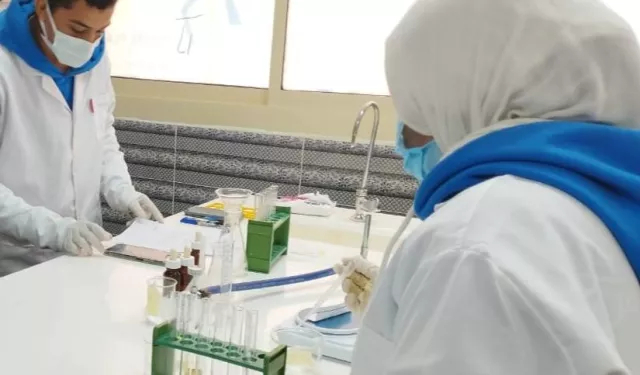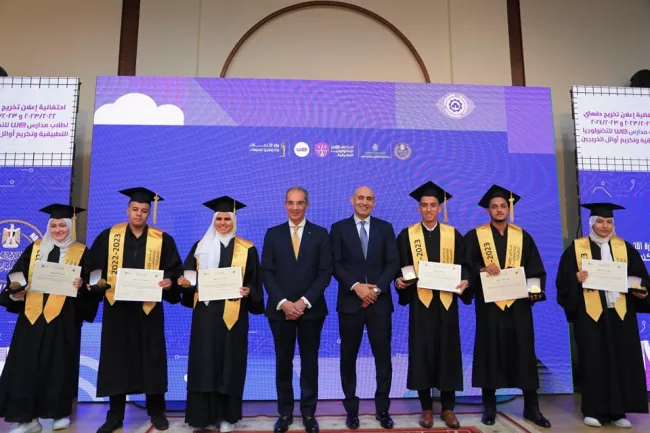
Applied Technology Schools: New path to unemployment
With a score of 250 out of 280 on his middle school certificate, Mostafa Walid qualified for Thanaweya Amma/general secondary education. Instead, his family enrolled him in an applied technology school to avoid the unpredictability of the high school system. Despite their efforts, he did not escape its pitfalls.
In Egypt, students complete nine years of compulsory education before branching into one of two tracks: Thanaweya Amma, the traditional three-year high school program, or technical and vocational education, which now includes Applied Technology Schools.
“A lot of relatives’ experiences with Thanaweya Amma weren’t encouraging, so we chose applied tech education, even though Mostafa’s score was 35 points above the Thanaweya placement threshold,” said Asmaa Ragab, Mostafa’s mother, explaining her choice.
Established by factories and companies, these schools promise students immediate employment in their institutions upon graduation. Additionally, many view them as an easier stepping stone to engineering schools, provided students achieve high final-year grades. In reality, these promises go unfulfilled.
The family had two school options, the first being WE School. However, Mostafa was accepted into its Sheikh Zayed branch in Giza, far from their home in Shubra, located in northern Cairo. Consequently, the family opted for the second option, Fresh International School, believing it would guarantee him a job in the affiliated factory.
“He might even get a scholarship abroad, like from the USAID, which is a partner in the school,” Asmaa told Al Manassa.
Egypt introduced this educational model in 2018 when former Minister of Education Tarek Shawki launched it in partnership with industrial companies.
The goal was to graduate highly skilled technicians who meet international standards to meet the job market. Initially, the schools attracted a large number of students due to their diverse specializations.
Parents’ demands
Two classes have graduated so far, yet none of the promises have materialized. Moreover, the path to engineering school has proven far more difficult than many anticipated.
This drove Mostafa’s mother and other parents to launch a Call To Action campaign via social media last September in hopes of finding solutions for the current graduating class. The campaign calls for securing jobs and allowing graduates to enroll directly in public universities.
Presently, they are being treated as technical diploma holders and must go through the certificate equivalency process to qualify for university admission.
Parents are also demanding that private engineering schools recognize and enable these graduates to pursue private education. Another demand is that they get priority admission to the Military Technical College, which does not currently acknowledge their degree, limiting their options for higher education.
Despite their eligibility to apply to private universities, graduates of applied tech schools who enrolled at the 6th of October Technological University last year encountered a problem.
Many were admitted to departments unrelated to their studies. According to Hossam Salem, a parent and founder of the Applied Technology Schools Facebook group now boasting 132,000 members.
“The first graduating class didn’t find enough spots in programming and telecom departments, so the university president placed the extra students in railway and textile departments,” he said.
English serves as the dominant language of instruction, which requires some students to take language classes. This is one of the reasons Mostafa and his classmates are calling for a tech high school track similar to the Thanaweya Amma, separate from tech education.
In Egypt, holding a technical diploma often carries societal stigma, it is perceived as inferior to the general secondary track and offers fewer pathways to higher education.
Therefore, Mostafa and his friends reject being labeled as technical diploma holders on their national ID cards.
Parents filed official complaints to the cabinet last December, taking their case all the way to parliament.
“Most MPs are aware of our demands,” Salem said.
Education and students, worlds apart
Applied tech schools fall under the technical education system and currently number 81 nationwide. They impose strict enrollment requirements, according to 2024 admissions criteria.
These criteria include a minimum score of 225 in third-year middle school and mandatory personal interviews for students and their families; conditions that seem reasonable considering the promises given to prospective students.
“They told us that if he only completes the third year of applied tech school without pursuing higher education, he’ll be able to get a job at Fresh Factory,” said Asmaa on the promises made to parents.
She was also told that if Mostafa wanted to continue his education, he could enroll at the Higher Technological Institute to study engineering without having to go through an equivalency process.
“They assured us that in this case, graduates would be hired as engineers at the factory, and that USAID would offer high-achieving students scholarships to study or work abroad. That’s why they call it an international certificate,” she added.
Despite these promises, there is no guarantee that Mostafa will secure a job after completing his final year, nor does he have the right to apply to engineering or computer science. Additionally, the USAID scholarships have been suspended indefinitely due to US President Trump’s decision to halt international aid.
The suspension of scholarships has stripped Mostafa of a key advantage and an incentive for students to excel, “most of the students studied hard hoping they’d get scholarships abroad,” Asmaa said.
Students worked together in groups of fours, project-based, throughout the year. “The USAID used to fund these projects, and the best innovative project would win an award,” Asmaa explained.
Meanwhile, the Ministry of Education continues to expand applied tech schools nationwide to fulfill the need for skilled technicians. According to Shady Zalata, the ministry’s media advisor, the aim is to graduate workers in modern fields such as AI, telecom, IT, and advanced agricultural technologies, with the potential for labor export.
According to an official statement, Minister of Education Mohamed Abdel Latif described the applied tech school model as a major success, citing its ability to provide job opportunities both domestically and abroad.
Furthermore, PM Mostafa Madbouly recently met with trainees at the Innovation Hub in Giza, who were students enrolled in training programs provided by the IT Institute, as well as graduates from Telecom Egypt Schools and the Digital Generations Initiative.
Madbouly directed that graduates be given priority admission to specialized colleges in communications and IT.
This aligns with promises made by Ahmed El-Gioushy, Sec-General of the Supreme Council of Tech Universities. However, parents remain skeptical. “El-Gioushy only promised us a fair chance in applying to tech universities, but we’re also demanding access to public universities because we pay between 15,000 and 20,000 pounds ($300–$400) annually,” said Salem.
They suspect that marketing the program to Gulf countries is merely a strategy to secure foreign funding.
Salem also questioned why officials continue to ignore the legitimate demands of new graduates, “what’s the point of more schools if there are no jobs?” he believes the officials are “burying their heads in the sand.”
“Hiring only 10 from a graduating class doesn’t mean you’re creating jobs. That’s just talk. In a year or two, the number of graduates will be massive, and we’ll have created a new unemployment crisis,” he added.
According to Mostafa, most students are forced to take jobs unrelated to their studies. Speaking to Al Manassa he stated, “The previous class studied programming, but they ended up working in textile factories, and others in railway jobs because they had no openings in the telecom company WE.”
Salem predicts a decline in enrollment in the upcoming academic year, citing the common response new parents receive when they inquire on the Facebook group: “Run away before your children’s future is ruined.”
He and other parents continue to wait for the Ministry of Education to respond to their demands. Meanwhile, Mostafa’s mother holds onto hope that her son will be admitted to an engineering school, and that officials will “do our children justice.”
(*) A version of this article first appeared in Arabic on Feb. 17, 2025
